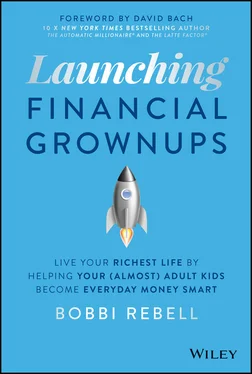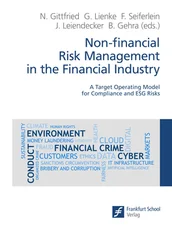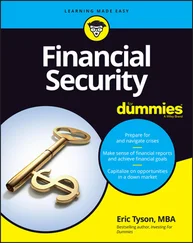Bobbi Rebell - Launching Financial Grownups
Здесь есть возможность читать онлайн «Bobbi Rebell - Launching Financial Grownups» — ознакомительный отрывок электронной книги совершенно бесплатно, а после прочтения отрывка купить полную версию. В некоторых случаях можно слушать аудио, скачать через торрент в формате fb2 и присутствует краткое содержание. Жанр: unrecognised, на английском языке. Описание произведения, (предисловие) а так же отзывы посетителей доступны на портале библиотеки ЛибКат.
- Название:Launching Financial Grownups
- Автор:
- Жанр:
- Год:неизвестен
- ISBN:нет данных
- Рейтинг книги:5 / 5. Голосов: 1
-
Избранное:Добавить в избранное
- Отзывы:
-
Ваша оценка:
- 100
- 1
- 2
- 3
- 4
- 5
Launching Financial Grownups: краткое содержание, описание и аннотация
Предлагаем к чтению аннотацию, описание, краткое содержание или предисловие (зависит от того, что написал сам автор книги «Launching Financial Grownups»). Если вы не нашли необходимую информацию о книге — напишите в комментариях, мы постараемся отыскать её.
Launching Financial Grownups
Launching Financial Grownups
Launching Financial Grownups
Launching Financial Grownups — читать онлайн ознакомительный отрывок
Ниже представлен текст книги, разбитый по страницам. Система сохранения места последней прочитанной страницы, позволяет с удобством читать онлайн бесплатно книгу «Launching Financial Grownups», без необходимости каждый раз заново искать на чём Вы остановились. Поставьте закладку, и сможете в любой момент перейти на страницу, на которой закончили чтение.
Интервал:
Закладка:
Review
1 Parents need to be wary of moving from helicopter parenting to concierge parenting.
2 Specific societal changes have transformed the parent–child money dynamic.
3 Parents need to maintain their authority, even with adult children.
4 Digital currency has complicated our approach.
5 Even the most nonmaterialistic kid needs to be taught to be a financial grownup.
6 Ultimately, parents' primary job is to make sure their children will be ready enough for the day we can't be there for them.
Note
1 1. https://www.smh.com.au/education/profoundly-dangerous-a-generation-at-risk-from-concierge-parents-20190322-p516q0.html
CHAPTER 2 The Family Ecosystem
A parent–child relationship is a financial relationship .
—Roy Feifer
After my first marriage ended, I found myself living with my parents, at age 30. I sold my apartment, packed up what little I got in the divorce, and moved into their extra bedroom. My childhood home in New Jersey had been sold so I was not in my childhood bedroom, but it felt oddly comforting regardless. I was devastated by the divorce and needed to be with my parents. I was so fortunate they were there for me.
My parents didn't charge me rent and didn't ask me to pay for my share of the groceries or the cable bill. Was I any less of a financial grownup? I'm not sure. I had a job, and I paid my personal bills. I didn't move into my parents' apartment because of a financial need. In fact, I had sold my apartment at a nice profit. But I'd be lying if I said I didn't feel vulnerable and insecure about my future – including my financial future. We did not discuss an exact timeline, but I always perceived living with them as short-term and transitional. I think my parents knew how wounded I was and did not want to push. In my mind I expected it to be a few months. It turned out to be more than a year. Looking back I'm so grateful that I had that emotional and financial backstop.
I share this story because it is essential that no one misunderstands the goals I am advocating for in this book. Parents can absolutely be generous, within their means, with their children – as long as they don't create a prolonged dependency. This is not about kicking out your kids. It's not about arbitrarily cutting them off before they are ready or just because they celebrate a given birthday or hit an adulting milestone. It is about being there to support them when they need you but knowing the difference between needs and wants – just as we talk about needs versus wants when it comes to spending money. Our goal as parents is to get them ready and able to cover their needs and then let them experience adulthood with all its ups and downs.
In the spring of 2020, countless young adults moved home to shelter in place with their parents during the pandemic, and many followed a similar pattern of moving home not because of financial need but because it just made sense given what was going on. This was a clear reminder that launching a financial grownup does not mean parents and their adult children can't be there for each other as a family in a crisis – financial or not. A family has to be an ecosystem that embraces its lifelong connections and support. Being a financial grownup does mean that our children have to be able to run their own lives and that as the younger generation moves through life, the roles and financial responsibilities will have to adapt to different life stages and challenges.
The Grownup Mindset
The most realistic mindset is to be able to adapt when your kids need you and to separate that from ongoing financial support of adult responsibilities because it is just easier to use money to solve problems and challenges. That said, there is nothing wrong with helping a child with the down payment for a home that will accelerate their path to financial independence if it does not impede your own financial goals and security. What should be avoided is paying their rent for a couple of decades! If that is happening, the child is living a lifestyle way beyond their means, and both generations need to do some serious introspection.
Creating or contributing to a college fund for a grandchild will ease the burden on young adults struggling to pay for the everyday expenses of parenting young children. That's a wonderful gift that will have a positive and priceless impact on the family. Remember, that grandchild's education will help launch them as financial grownups. And yes! You can absolutely treat your kids to a memorable family vacation, a nice dinner out, or a spa day. It's fine.
This all assumes that you can afford to do this – which is not always the case. According to a 2019 Bankrate survey, 50 percent of parents sacrifice their retirement savings to help their adult children. 1 In that case, we need to resist our desire for generosity at the expense of our own self-sufficiency in the years to come. It is not surprising that this trend continued during the pandemic in 2020. CreditCards.comfound that 79 percent of parents who helped their kids financially during the pandemic did so with money they would have used for their own personal finance needs. 2 This data is alarming because parents are putting their own financial health at risk, increasing the chances that ironically they will need their kid's financial help.
Let's face it: the only thing worse than needing your adult kids to bail you out financially is probably them not being able to help because they are still not financially secure themselves. In fact, during the pandemic, many parents faced unexpected economic turmoil and were reliant on young adult children to help the family. That's why it is so important to develop a family ecosystem, where we can all aspire to be financially independent of each other but know that we are also there for each other in the seasons of life where we need each other.
The Benefits of a Strategic Boost
Jason Feifer is editor in chief of Entrepreneur Magazine and hosts several podcasts, including Hush Money . He lives in Brooklyn with his wife and kids. As a child, he says he was not materialistic. He would chide his dad for buying nice cars and was keenly aware that his family had a strong financial foundation.
I reached out to Jason after his Hush Money podcast cohost Nicole Lapin called him out for having recently admitted that his parents still paid his phone bill. Jason, age 39, appeared to be a fully financially independent and, frankly, incredibly successful adult. I wanted to hear more about what exactly was going on in the Feifer family ecosystem, so I asked his dad, Roy Feifer, to join us as well. Our conversation revealed a pattern of parental financial support early in Jason's career. In context, though, it was done with intention and purpose and got successful results that may not have happened otherwise. Support at the right time can be a powerful strategy if it can fit into your family ecosystem.
Jason explained that he resisted financial support early in his career even as his dentist dad would offer it. But Jason was ambitious, and when he got an offer for his dream job he was determined to make the move to New York City. “That meant that all my expenses went way up. I was 28 years old. It was 2008. I was making $50,000 at Men's Health and I got their blessing and encouragement.” Jason also got their financial support. They subsidized his one-bedroom Manhattan apartment so he would not have to live far away from his office and face a tough commute while working long hours. He was also able to live without roommates. His parents were pretty hands-on when it came to the logistics of finding that place and making sure Jason knew all that would be involved in renting an apartment and running his financial life in New York. Some might say they were doing a little concierge parenting, but they also were steering him on a deliberate gradual path toward independence.
Читать дальшеИнтервал:
Закладка:
Похожие книги на «Launching Financial Grownups»
Представляем Вашему вниманию похожие книги на «Launching Financial Grownups» списком для выбора. Мы отобрали схожую по названию и смыслу литературу в надежде предоставить читателям больше вариантов отыскать новые, интересные, ещё непрочитанные произведения.
Обсуждение, отзывы о книге «Launching Financial Grownups» и просто собственные мнения читателей. Оставьте ваши комментарии, напишите, что Вы думаете о произведении, его смысле или главных героях. Укажите что конкретно понравилось, а что нет, и почему Вы так считаете.












